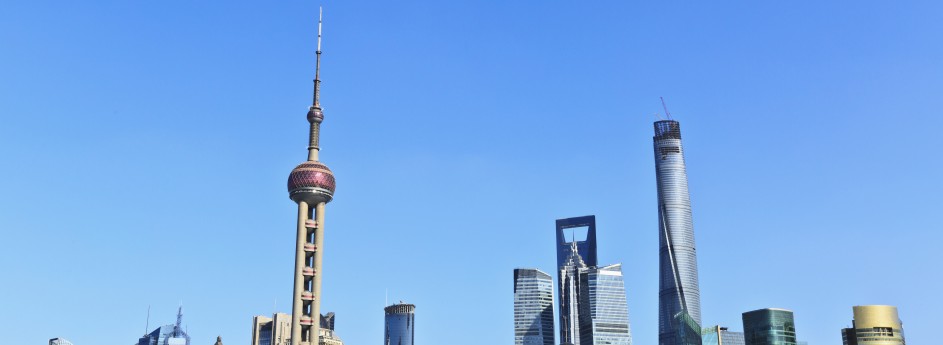China Revises Its 2013 GDP Upward by 3% to US$9.6 Trillion
An earlier post this month cited the IMF and other sources that China’s GDP measured by purchasing power parity (PPP) has officially surpassed the US’s, a major milestone on the road to completely eclipsing the US in exchange rate terms which should occur sometime around 2020 or a little later.
With Chinese statisticians raising the country’s 2013 nominal GDP figures by 3% to US$9.6 trillion and projecting 2014 growth to be in the neighbourhood of 7.4%, China’s 2014 nominal GDP should fall in around $10.3 trillion, almost exactly the same threshold achieved by the US in 2000. Supposing a growth rate of around 2.5% for the year, the US should grow to about $17.84 trillion.
On the other hand, measured by PPP, China’s GDP for last year would be $18.13 trillion as opposed to $17.6 trillion and projecting the same rate of growth for this year, China’s 2014 PPP GDP may top $19.47 trillion.
———-
China on Tuesday raised its official estimate of last year’s gross domestic product, possibly moving closer to passing the United States as the biggest economy.
Last year’s official GDP value will be raised by 3 percent following a regular economic census, the director of the National Bureau of Statistics, Ma Jiantang, said at a news conference.
Ma gave no details but based on previously reported data, the increase would make 2013’s GDP about $9.6 trillion or just under two-thirds of U.S. output of $16.8 trillion.
China’s growth fell to a five-year low of 7.3 percent last quarter. The economy grew 7.7 percent in 2013 though that figure is likely to change after the revision of the year’s GDP estimate.
Analysts expect the ruling Communist Party to cut next year’s growth target to 7 percent. But that still is more than double the 3 percent forecast by the International Monetary Fund for the U.S.
China is forecast to become the biggest economy as early as 2020, though its income per person would be much lower than developed nations such as the U.S.
In 2009, the government raised its estimate of 2007 growth from an already high 11.9 percent to 13 percent. That meant China moved ahead of Germany as the third-largest economy behind the U.S. and Japan.
In 2010, China passed Japan as the second-biggest economy.
– AP
And You Wonder Why China Formed Its Own Multilateral Banks
There is one prime reason why China is frustrated with US-led multilateral financial institutions – the inability or reluctance on the part of the Republican dominated US Congress to ratify the International Monetary Fund’s (IMF) 2010 Quota and Governance Reforms. Ironically, the reforms were driven through by the Americans whose obstructionism now forces the IMF board to explore a “Plan B” for “alternative options”.
Building on the 2008 reforms, the current package which must be accepted by 3/5 of members that have 85% of total voting power would have resulted in a major realignment of quota shares in favour of emerging economies and developing countries (EMDCs). Needless to say, currently, the US dominates with 16.75% of votes followed by Japan (6.23%), Germany (5.81%) and France and the UK (each with 4.29%). China leads the BRICS countries with 3.81%, then Russia (2.39%), India (2.34%), Brazil (1.72%) and South Africa (0.77%).
Apart from doubling the quotas of special drawing rights (SPR) to worth some US$737 billion, the 14th General Review of Quotas would have shifted 6% of quotas from over-represented to under-presented countries, lifting all but one of the BRICS into the 10 largest shareholders with China rising to no.3. But, obviously, in the backdrop of Western sanctions imposed on Russia over the Ukraine crisis, any reform that would benefit Russia could not possibly be contemplated by the US and its allies.
In a statement on the US inaction, IMF Managing Director Christine Lagarde expressed her deep regret: “The IMF’s membership has been calling on and was expecting the US to approve the IMF’s (reforms) by year end. I have expressed my disappointment to the US authorities and hope that they continue to work toward speedy ratification.” This represents the second time this year the US has refrained from approving, dampening the prospects of its passing in the first half of next year.
Chinese foreign ministry spokesman Hong Lei also sounded China’s dissatisfaction: “China is deeply disappointed by the US parliament’s failure to make the IMF 2010 funding and governance reform spending legislation…Implementing (the reform) is crucial for maintaining the credibility, effectiveness, and legality of the IMF.”
But, it’s not only the IMF that needs urgent reform, the World Bank (WB) and its sister institution the Asian Development Bank (ADB) require significant realignment as well. Among the multilateral financial and monetary institutions created after WWII, the IMF is ordinarily lead by a European, the WB by an American (currently Jim Yong Kim), and the ADB by a Japanese (Takehiko Nakao).
In 2010, voting power in the WB was revised somewhat to better reflect the interests of EMDCs but the West and Japan still dominate: US (15.85% down from 16.36%), Japan (6.84% down from 7.85%), Germany (4% down from 4.48%), France and England (both 3.75% down from 4.3%) and Canada (down to 2.43%). The BRICS had China with 4.42% up from 2.78%, India with 2.91% up from 2.78%, Russia roughly at par at 2.77%, Brazil up to 2.24% from 2.07%, and South Africa down from 0.85% to 0.76%.
As of last year, the top ten voting power countries in the ADB were: the EU (15.718%), Japan (12.835%), the US (12.747%), China (5.474%), India (5.384%), Australia (4.946%), Canada (4.5%), Indonesia (4.437%), South Korea (4.345%), Germany (3.773%), and Malaysia (2.486%). The top three regions/countries alone account for 41.3% of the total vote. Adding in Australia, Canada and Germany, the voting power of Western countries equals 54.519% assuring the passing of Western agendas.
Given the size of its economy that should top US$9.9 trillion by year end using exchange rate terms (the IMF already has China eclipsing the US in 2014 using purchasing power parity (PPP) @ US$17.6 trillion to $17.4 trillion), it is no wonder China and other EMDCs demand a bigger say and role in the governance and loaning practices of these institutions.
In my next post, I’ll focus on the new multilateral banks and funds that China has conceived and set up over the past year at the behest of President Xi Jinping: the BRICS New Development Bank, the BRICS Contingent Reserve Fund, The Asian Infrastructure Investment Bank, and the land-based and maritime Silk Road funds. Chinese explanations to the contrary notwithstanding, most analysts perceive these institutions and funds to be rivals of US-led counterparts.
Martin Lee Overstates the Case of China’s Promises on Democracy in Hong Kong: ABC Analysis
Further to a previous post refuting the has-been agitator for ‘true democracy’ in Hong Kong Martin lee’s wrongful claims that China promised full-fledged democracy in the Basic Law, the Australian Broadcasting Corporation’s (ABC) Fact Check special report has done a good service in clarifying whether Mr Lee is right in his claims. Asked for the basis of his claim that democracy was promised to Hong Kong, Mr Lee referred to three documents that supposedly supported his claim: the Sino-British Joint Declaration on Hong Kong’s handover, Hong Kong’s Basic Law, and international law.
Fact Check’s verdict: Mr Lee overstates his case.
Here are some excerpts from the lengthy Fact Check: Was Hong Kong ever promised democracy?
On the negotiations leading up to the Sino-British Joint Declaration on Hong Kong’s handover:
…Britain’s chief negotiator and ambassador to China from 1978 to 1983, Sir Percy Cradock, said in an interview broadcast on ABC’s Four Corners a week before the 1997 handover, “unfortunately over the last four years we have given them the impression… they could have improved democracy now and also improved democracy after 1997.”
“That was never a possibility and when they’ve come to realize it, as they have now, they are naturally feeling bitter and disillusioned,” he said.
British diplomats to China, and later Hong Kong’s last governor, Chris Patten, have hinted at the difficulties in negotiating to have more stringent democratic principles enshrined in Hong Kong law, and the backflip performed by Britain on the issue as it struggled to maintain close diplomatic and trade ties with China.
On the Joint Declaration:
…The UK Parliament’s Select Committee on Foreign Affairs has intermittently reported on the status and stability of Hong Kong since the 1997 handover.
In a report released in November 2000, the Committee stated that during negotiations between Britain and China for the handover, there was a preference by both parties to leave out any reference to democracy, given “there was nothing approaching democracy in Hong Kong… when the Joint Declaration was signed [in 1984].”
The UK Select Committee concluded:
“The Chinese government has therefore formally accepted that it is for the Hong Kong government to determine the extent and nature of democracy in Hong Kong. However, there are reasons for doubting whether the Chinese government is in practice sanguine about the prospect of untrammeled democracy developing in Hong Kong
On Hong Kong’s Basic Law:
In 1990, China approved Hong Kong’s Basic Law, which is recognized as operating like a constitution governing Hong Kong, and came into effect after the handover in 1997.
Mr Lee says several sections of the Basic Law underpin Hong Kong’s right to democracy – Articles 26, 45 and 68, and Annexes I and II.
Article 26 reads:
Permanent residents of the Hong Kong Special Administrative Region shall have the right to vote and the right to stand for election in accordance with law.
Article 45 states in part:
The method for selecting the chief executive shall be specified in the light of the actual situation in the Hong Kong Special Administrative Region and in accordance with the principle of gradual and orderly progress. The ultimate aim is the selection of the chief executive by universal suffrage upon nomination by a broadly representative nominating committee in accordance with democratic procedures.
Article 68 refers to the legislative council and says the “ultimate aim is the election of all the members of the legislative council by universal suffrage”.
Following the release of China’s August 2014 decision, vice secretary-general of the National People’s Congress Standing Committee Li Fei disputed calls to implement an internationally accepted definition of democracy in Hong Kong. He told a press conference that “international standards” clearly run against the Basic Law, and such “unpractical” calls had led to “a tremendous waste of time” in Hong Kong society.
“Having two or three election candidates will make for an efficient election system and complies with the opinions of the majority expressed during a five-month consultation conducted by the HKSAR government”.
On international law:
Mr Lee referred Fact Check to basic democratic rights enshrined in the International Covenant on Civil and Political Rights which the protesters say should extend to how elections are held in Hong Kong, because the language used in Article 3(5) of the Joint Declaration reflects certain rights contained in the ICCPR.
Hong Kong is not a signatory to the ICCPR. Instead, in 1976 the United Kingdom ratified the international treaty, and extended the protections contained in the document to its dependent nations, including Hong Kong.
Crucially, however, it carved out Article 25 of the ICCPR and said it did not apply to Hong Kong. This was in recognition of the fact that Hong Kong was not a democracy.
That Article contains the right for any citizen, without unreasonable restrictions, to “take part in the conduct of public affairs, directly, or through freely chosen representatives”, and “to vote and to be elected at genuine periodic elections which shall be by universal and equal suffrage…”
Academic Geping Rao wrote in a legal journal in 1993 that “The United Kingdom stated that based on the fact that no seats in the Legislative Council in Hong Kong were elected at that time, it would reserve Article 25 for the reason that its intent was not to require the establishment of an elected executive or legislative council in Hong Kong, where none had previously existed.”
“Changes have since occurred which put into question the necessity of continuing this reservation,” he said.
When Hong Kong later mirrored the language of the ICCPR in Article 3(5) of its Basic Law in 1990, it again left out the reference in Article 25 of the ICCPR to citizens being able to vote, “and be elected at genuine periodic elections”.
On Hong Kong electoral reforms:
…Beijing has the power to amend Hong Kong’s Basic Law. The NPCSC did so in December 2007, and again in August 2014 when it released rulings on how elections are to be carried out.
The NPCSC’s 2007 decision foiled hopes of democratic groups by ruling out direct elections in 2012. Instead, it suggested 2017 as a possible date to implement universal suffrage, declaring:
… that the election of the fifth chief executive of the Hong Kong Special Administrative Region in the year 2017 may be implemented by the method of universal suffrage; that after the chief executive is selected by universal suffrage, the election of the Legislative Council of the Hong Kong Special Administrative Region may be implemented by the method of electing all the members by universal suffrage.
China’s 2007 decision repeats the limitation contained in Article 45 of the Basic Law that a “broadly representative nominating committee” would be formed to nominate a certain number of candidates, who would then be elected “through universal suffrage by all registered electors of [Hong Kong]… and officially appointed by Beijing”. The size of the committee has been progressively increased from 400 in 1998 to 1200 in 2012.
The verdict
Martin Lee says Hong Kong was promised democracy and that three legal instruments prove it. British diplomats involved in negotiating the 1997 handover of Hong Kong to China have said no such promise was explicitly given.
The legal instruments do not preclude a gradual and steady move towards democracy, although there is argument about how China and Britain, and now Hong Kong, define democracy.
Legal academics have various opinions: some say the documents support China’s position that chief executive candidates were always intended to be elected from those chosen by a committee; others say the documents prove China intended for Hong Kong to move towards a government based on universal suffrage.
The documents are ambiguous and can be interpreted to favour either side’s argument, however any claim that Hong Kong has been promised democracy should be tempered by evidence that China did not explicitly include a timetable for steps to universal suffrage, did not define democratic principles, and did not allow international standards for free and fair elections to apply in Hong Kong.
Mr Lee’s claim is overstated.
The Fact Check in its entirety can be seen at: https://au.gwn7.yahoo.com/w1/news/a/-/local/25786050/fact-check-was-hong-kong-ever-promised-democracy/



